广州版小学英语六年级上每单元知识点
新版广州版小学英语六年级上册Unit6知识点及练习题

一、课前小测1)选词填空1. It’s time ____ ___ (to / for) school.2. It’s time ____ ___ (to / for) go home.3. Xiaoling is tired. She____ ___ (don’t / doesn’t) fell well.4. You shouldn’t eat too____ ___ (much / many) chocolate.5. There are____ ___ (lot of / lots of) sweets on the table.6. Do you walk ____ ___ (many / a lot) every day?7. How ____ ___ (many / much) milk do you drink every day?2)用所给词的适当形式填空1.Look, the _________ (four) lady is my mother.2. What ______________the men __________ (do) now?They ______________ (water) flowers.3. My sister is very good at _______________ (skip).4. There ________ (be) any apples in the fridge but there _________some coffee in it.5. Tomorrow the policeman _____________(see) an English film.6. Do you like _____________ (swim) in the river?7. Xiaohong usually ________ (read) books and ___ __ (do) her homework in the evening.8. _______________ (Be) you from Japan? No, I ______________(be) from China And Wang Dong ____________ (be) from China, too.9. Can you ________________ (close) the window?10. It’s time for ____________ (sing) now. Let’s ___________ (sing) an English song.二、听力训练课堂表现:三、Unit6单词秘密简单的最少(小)至少较少的多油的;油腻的最后地微笑;笑容甚至医生护士简单的可乐仍然节食;限食保持一个良好的饮食习惯四、Unit6 短语take exercise, stay healthy, at least, keep a good die五、Unit6 句型1. First, get plenty of sleep.2. Don’t eat too much sweet or oily food.3. How old does Mr Li look?4. Get up early and go to bed early.六、知识考点1. Keep a good diet. 保持一个良好的饮食习惯。
六年级上英语知识点广州新版

六年级上英语知识点广州新版集团标准化办公室:[VV986T-J682P28-JP266L8-68PNN]个性化教学辅导教案学科:英语任课教师:陈老师授课时间: 2015 年9 月 12日(星期考点:人称代词和物主代词能力:方法:称代词和物主代词的用法作业完成情况:优□良□中□差□建议__________________________________________Unit3 Where are you fromStep1:检查作业,讲解习题,复习上节课内容。
错题回顾:一、选择a或an填空。
_____apple ______useful pen _____hour ______house______umbrella ______university old man interesting story②This is ______ ring, and it is _____orange ring. ③There is _____ picture on the card.⑥That is _____ ID card. ⑨This is _____useful knife.( ) 12. He likes ______his father ____the cow.A. helping; milksB. helping; milkC. helps; milkD. help;milks( ) 9. My ball is here. Where is_____?A. yoursB. yourC. you( ) 12. ----Is this ______ eraser? -----No, ______is white.A. your, myB. yours, mineC. your, mine( ) 13. ----Is it _____ football? -----No, _____is under the table.A. his, heB. his, hisC. his, hers( ) 16. ----Are these pens_____? ---No, they are _____.A. yours, hisB. his, herC. ours, theirA. Our, TheirB. Ours, TheirsC. Our, TheirsStep2: Warm up热身Step 3:复习Unit31)单词和词组城市学生安静的便宜的现代化的嘈杂的宽阔的缓慢的拥挤的舒服的沉重的,拥挤的1. Where you from? 你来自哪里?2. I there. 我出生在那儿。
六年级广东版英语知识点
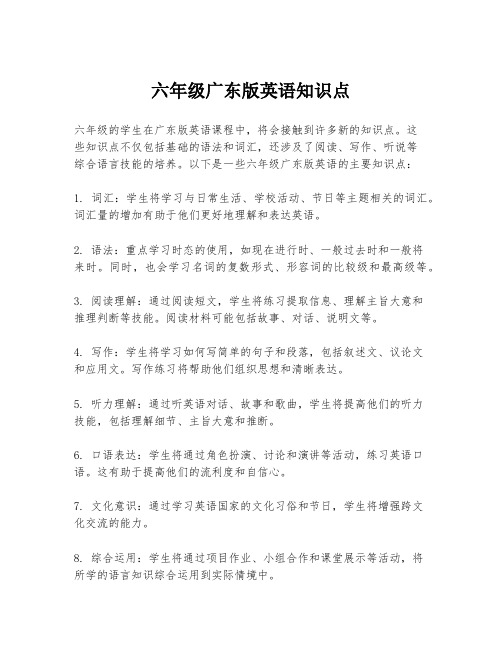
六年级广东版英语知识点六年级的学生在广东版英语课程中,将会接触到许多新的知识点。
这些知识点不仅包括基础的语法和词汇,还涉及了阅读、写作、听说等综合语言技能的培养。
以下是一些六年级广东版英语的主要知识点:1. 词汇:学生将学习与日常生活、学校活动、节日等主题相关的词汇。
词汇量的增加有助于他们更好地理解和表达英语。
2. 语法:重点学习时态的使用,如现在进行时、一般过去时和一般将来时。
同时,也会学习名词的复数形式、形容词的比较级和最高级等。
3. 阅读理解:通过阅读短文,学生将练习提取信息、理解主旨大意和推理判断等技能。
阅读材料可能包括故事、对话、说明文等。
4. 写作:学生将学习如何写简单的句子和段落,包括叙述文、议论文和应用文。
写作练习将帮助他们组织思想和清晰表达。
5. 听力理解:通过听英语对话、故事和歌曲,学生将提高他们的听力技能,包括理解细节、主旨大意和推断。
6. 口语表达:学生将通过角色扮演、讨论和演讲等活动,练习英语口语。
这有助于提高他们的流利度和自信心。
7. 文化意识:通过学习英语国家的文化习俗和节日,学生将增强跨文化交流的能力。
8. 综合运用:学生将通过项目作业、小组合作和课堂展示等活动,将所学的语言知识综合运用到实际情境中。
9. 自我评价:鼓励学生进行自我反思和评价,以提高自主学习能力和自我监控能力。
10. 学习策略:教授学生有效的学习策略,如预习、复习、笔记技巧等,帮助他们更有效地学习英语。
通过这些知识点的学习,六年级的学生将为进一步的英语学习打下坚实的基础,并为将来的学术和职业生涯做好准备。
记住,学习语言是一个持续的过程,需要耐心和持续的努力。
广州版小学六年级英语教材知识点笔记
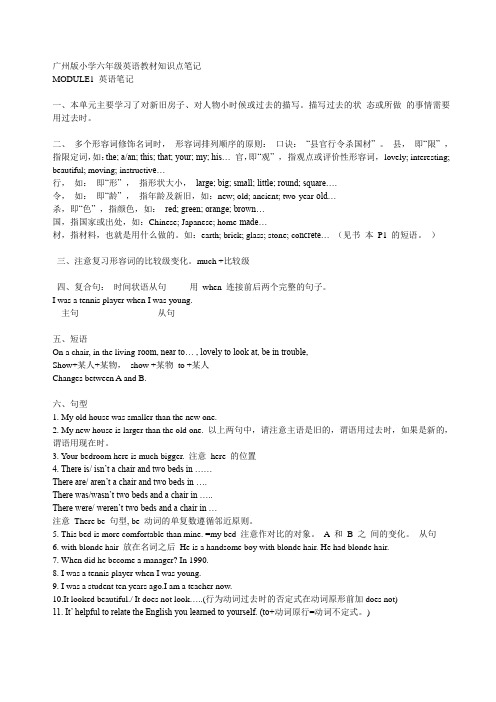
广州版小学六年级英语教材知识点笔记MODULE1 英语笔记一、本单元主要学习了对新旧房子、对人物小时候或过去的描写。
描写过去的状态或所做的事情需要用过去时。
二、多个形容词修饰名词时,形容词排列顺序的原则:口诀:“县官行令杀国材” 。
县,即“限” ,指限定词,如:the; a/an; this; that; your; my; his… 官,即“观” ,指观点或评价性形容词,lovely; interesting; beautiful; moving; instructiv e…行,如:即“形” ,指形状大小,large; big; small; little; round; square….令,如:即“龄” ,指年龄及新旧,如:new; old; ancient; two-year-old…杀,即“色” ,指颜色,如:red; green; orange; brown…国,指国家或出处,如:Chinese; Japanese; home-made…材,指材料,也就是用什么做的。
如:earth; brick; glass; stone; co ncrete… (见书本P1 的短语。
)三、注意复习形容词的比较级变化。
much +比较级四、复合句:时间状语从句--------用when 连接前后两个完整的句子。
I was a tennis player when I was young.主句从句五、短语On a chair, in the living-room, near to… , lovely to look at, be in trouble,Show+某人+某物,show +某物to +某人Changes between A and B.六、句型1. My old house was smaller than the new one.2. My new house is larger than the old one. 以上两句中,请注意主语是旧的,谓语用过去时,如果是新的,谓语用现在时。
广州版小学英语六年级上册复习归纳1
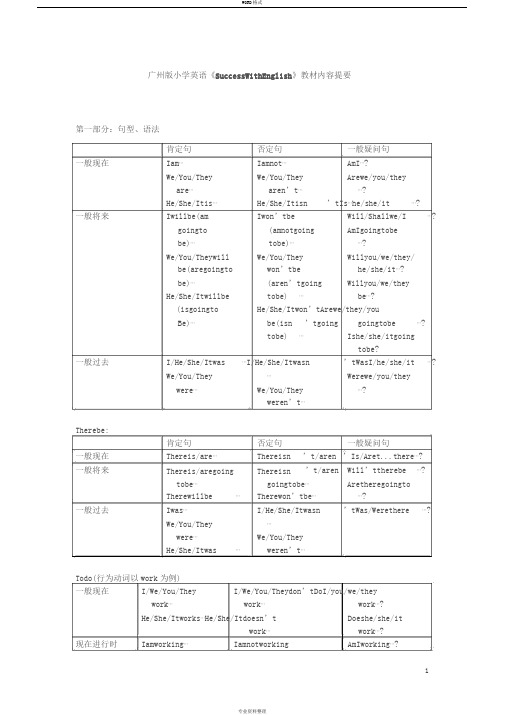
广州版小学英语《SuccessWithEnglish》教材内容提要第一部分:句型、语法肯定句否定句一般疑问句一般现在Iam⋯Iamnot⋯AmI⋯?We/You/They We/You/They Arewe/you/theyare⋯aren’t⋯⋯?He/She/Itis⋯He/She/Itisn ’tIs⋯he/she/it ⋯?一般将来Iwillbe(am Iwon’tbe Will/Shallwe/I ⋯?goingto (amnotgoing AmIgoingtobebe)⋯tobe)⋯⋯?We/You/Theywill We/You/They Willyou/we/they/be(aregoingto won’tbe he/she/it⋯?be)⋯(aren’tgoing Willyou/we/theyHe/She/Itwillbe tobe) ⋯be⋯?(isgoingto He/She/Itwon’t Arewe/they/youBe)⋯be(isn ’tgoing goingtobe ⋯?tobe) ⋯Ishe/she/itgoingtobe?一般过去I/He/She/Itwas ⋯I/He/She/Itwasn ’t WasI/he/she/it ⋯?We/You/They ⋯Werewe/you/theywere⋯We/You/They ⋯?weren’t⋯Therebe:肯定句否定句一般疑问句一般现在Thereis/are⋯Thereisn ’t/aren ’Is/Aret...there⋯?一般将来Thereis/aregoing Thereisn ’t/aren Will’t therebe ⋯?tobe⋯goingtobe⋯AretheregoingtoTherewillbe ⋯Therewon’tbe⋯⋯?一般过去Iwas⋯I/He/She/Itwasn ’t Was/Werethere⋯?We/You/They ⋯were⋯We/You/TheyHe/She/Itwas ⋯weren’t⋯Todo(行为动词以work为例)一般现在I/We/You/TheyI/We/You/Theydon’t DoI/you/we/theywork⋯work⋯work⋯?He/She/Itworks⋯He/She/Itdoesn’t Doeshe/she/itwork⋯work⋯?现在进行时Iamworking⋯Iamnotworking AmIworking⋯?1We/You/Theyare ⋯Areyou/we/theyworking⋯We/You/Theyaren’t working⋯?He/She/Itis working⋯Ishe/she/itWorking⋯He/She/Itisn ’t working⋯?working⋯一般将来I/We/You/He/She/It I/We/You/He/She/It/They WillI/we/you//Theywillwork won’twork ⋯they/he/she/it⋯I’mnotgoingtowork ⋯work⋯?I’mgoingtowork We/You/Theyaren’t AmIgoingto⋯goingtowork ⋯work⋯?We/You/Theyare He/She/Itisn ’tgoingtoAreyou/we/theygoingtowork ⋯work⋯goingtoworkHe/She/Itisgoing ⋯?towork⋯Ishe/shegoingtowork⋯?一般过去I/We/You/They/He/ I/We/You/They/He/ DidI/we/you/they/She/Itworked ⋯She/Itdidn ’twork ⋯/he/she/itwork⋯?1.读下面的特殊疑问式的句子,你能总结一些特殊疑问句的构成的规律吗?I.Wholivesthere.Whoissingingintheroom?Whowasathomeyesterday?II.Whatdoeshedo?Whatishedoing?Whatdidtheydo?Whendoesheusuallygetup?Whendidshehavedinneryesterday?Whereishenow?Wherearetheyplantingtrees?Wheredidtheyplayfootball?Howisyourmother?Howishecoming?Howdidtheygetthere?Whydoeshegothere?Whydidshegothere?III.Whosebookisthis?Whoseparentsarecominghere?Whichbookisyours?Whichpresentsdidhegiveyou?22.关于形容词、副词的比较级和最高级(1)你知道形容词、副词的比较级和最高级构成的一些规律吗?A.一般情况下加-er,-est:long–longer,longest;small–smaller,smallestB.重读闭音节,双写最后一个字母再加-er,-est:big–bigger,biggest; hot–hotter,hottestC.辅音字母加y,改作后一个字母y为i再加-er,-est:funny–funnier,funniest, lucky–luckier,luckiestD.部分双音节和多音节词,加more,most:slowly–moreslowly,mostslowly; moredelicious,mostdeliciousE.不规则变化:good–better,best; bad–worse,worst(2)你知道形容词、副词的比较级和最高级句子的构成吗?A.Thisbookisnewerthanthatone.TheEnglishbookisthenewestofthethree.MikerunsfasterthanJohn.Mikerunsfastestinhisclass.B.Thisflowerismorebeautifulthanthatone.Thistreeistheoldestinthepark.Thegirlisswimmingbetterthanthegirl.Jimswimsbestinhisgroup.C.Snakesaremoredangerousthanfrogs.Themeetingisthemostimportant.Theoldmanwalksmoreslowlytheyoungman.Katejumpshighestinherclass.D.TimhasmorebooksthanJim.Timhasthemoststampsinhisclass.3.关于代词some-,any-,no-,every-:(1)some-多用在肯定句表示请求得到某些东西的句子:Someonewillcomehere.Wouldyoulikesomethingtoeat.(2)any-多用于疑问句或否定句:Isthereanythinginthebox?Wedon’twanttoseeanyoneofthem?(3)no-是事实的否定:Thereisnothingintheroom.Nobodycandothat.(4)代词some-,any-,no-,every-语法上看成是第三人称单数:Thereissomethinginthebottle.Everyonelikesit.3表1:小学教材各话题板块涉及的主要内容话题板主要涉主要涉及单词快及模块数字、B1M6 基数、序数、星期、数量、B3M5-6 日期、月份、季节、时间、B5M1 年份、钟点的表达、日期计量单位等购物B3M1 money,change,shopB4M4 assistant,vendor人物:年B1M2 表男女老少的类别龄、体貌B2M3 名、身体部位名、服衣着、性B3M1-4 饰名、体质与外貌形格、职业、B4M1-2 容词、性格形容词、爱好与特B5M2 职业、表特长爱好的长、理想、B8M3 动词生平B8M5学校生B4M3 科目名、作息动词、活:课B5M1 运动、娱乐动词程、作B6M1息、课B6M3外活动家庭生B2M1 家庭成员名、职业名、活:家B3M6 爱好特长动词、娱乐庭成员B4M4 形式名词及动词、家及其职B5M1 务动词、频度副词业与爱好、家务与休闲食品B4M4 食品名、三餐名、进B6M5 食动词生活习B6M2 描述体质的形容词、惯与健B6M5 描述身体感觉的形容康词、生活习惯的动词、主要涉及语法、功能等名词复数;Howmany/Howheavy/Howlong/Whattime/When 等引导的疑问句和回答等;时间、星期、日期的询问与表达;招呼与应答;表达要买某种商品或询问是否有某种商品;对商品的评论;询问价格;询问是否还需其他商品及应答;找零描述体质外貌的各种句式:be+adj,has/have+n,with+n,in+n 的用法表示爱好与特长的句式: likesth/doingsth,begood/badat⋯,do(es)⋯well;描述爱好与行为习惯等的一般现在时:Hereadsalot.HewatchesTVveryoften等;表示职业、愿望的句式:be+jobs;Iwanttobea⋯whenIgrowup.IhopeIcan⋯叙述生平的句式:beborn⋯一般现在时的各种句式一般现在时的各种句式;询问与表达频度;谈论对娱乐节目的爱好;评论娱乐节目三餐时间;谈论饮食习惯;对饮食的偏好与评论;待客用语及应答描述身体感觉和状况看病用语情态动词 should的用法祈使句4(电B7M3-4话)邀约与聚会动物、B1M2 植物B2M2B5M2-3B5M5B6M4 天气与B6M1 季节B6M6节假B1M5 日、旅B5M4行、城B7M1-2市、计B7M6划与建B7M3-4议地点、B2M4-6方位与B5M6 方向变化:B6M3 人的变B8M1 化、地方的变化过去的B7M5事情B8M2-4邀请与应答电话用语商量聚/约会时间、地点、交通方式等动植物名、动物行为描述动物外貌和习性的一般现在时方式动词、公园行为祈使句动词、描述动作的副规则的表达(can,need,must,mustn’t)词天气形容词、气象名询问与描述天气词、季节性娱乐和体比较天气育活动动词谈论对季节的偏好节假日名、交通方式询问计划和称述计划名、国家与城市名、各种提建议的句式描述城市的形容词、描述和比较城市休闲娱乐动词描述传统节日房间名、家具名、场描述位置关系所名、学校场室名、问路和指路方位介词、描述场室描述场室的形容词动词的过去式描述体貌性格、职业身份、行为习惯、能力、场所处室、天气等各种变化动词的过去式讲述过去的事情故事中的词组描述人物的生平讲述故事表2:小学教材话题分配Module Book1Book2Book3Book4Book5Book6Book7Book81 GreetingsRelationships Clothes Age Routines OurLifePlansChanges√/Shopping √And√√√√Dates√2 MyBody Animals People Activities AbilitiesSeeing aCitiesDiaries√√√/Hobbies√√Doctor√√√3 StationeryNationalitiesOccupations Sports Plants Our an Famous√√√School Invitation People √√and Our5Class √4 Colours MyRoom PeopleWho Entertainment TravelWildOnthe Stories √ HelpUs √√ Animals telephon e and√√Fables√√5 Transport MyHouseTime Foodand Zoo Eating ThePast Hopes√ √ √ Drink Animals Habits √and √ √Fantasi es √ √6 Numbers MySchool DaysOfThe Shoppin g Directio ns Weather Festivals andShapes √ Week √ √ √ √√ √表3:小学教材动词分类日常作息:wakeupgetupgetdressedwashtheface brush theteeth have breakfastgo to school goto workhave lessons havelunchtakearest play sport s takeexercises go(back)homehavedinnerdohomework haveabathgotobedsleepeatdrinkcook娱乐休闲:haveapartyhaveapicnic dosomereading doshoppinggoshopping goboatinggoswimming gosightseein ggofishinggotravelinggoonarivercruise gotothecircus goto theflower show goto th e cinema gotoa footbal l matchwatch afootball matchonTVcome to tea seea filmwatch thebirds listen to music / theradiowatch TV climbthemountain playcards e-mailafriendwritealettervisitafriend/Beijingmeetafriend爱好与特长: singdrawpaintplaythepiano/theguitar dowellin ⋯makeashipmodelplaycardsplaychess体育运动: runswimskiprope swim play basketball playfootball playtabletennisplaytennisplaybadmintondoweight-lifting家务:watertheflowersdogardeningplanttrees/flowerscleanthehousesweepthefloor washthedishes cook washthecar washclothes feedthepet学习:read listen speak write study learn practice hand inthehomework borrowabook returnabook catchupwithteach markthehomework preparethelessons tellastory6心理和情感活动:want love enjoy like dislike love prefer hope wish agreewith think dream feelsad/happy/excited/boredworry身体健康:takeexercise seeadoctorhaveacold/fever/toothache/headacheeat drink takethemedicine goonadiet feeltired/hot/cold/ill/sick感官动词:listento hear lookat see watchfeelhot/cold/tired soundinteresting/different/greatlookyoung/tall/beautiful/fresh/good种植活动:grow/plantatree grow/plantflowers watertheflowers digahole fillintheearth pickupthefruit appear位置移动:leave leavefor startfor move bring take climb run walk swim jump fly sitdown standup throw⋯at⋯travel go comegetto⋯getoutof⋯getdown fall fallover与职业有关的动词:work putoutfires cleanupeverythingdeliverletterscatchcriminals servefoodanddrinks helpinashopdriveataxi/anambulance checkyourteeth helpustolearnhelpsickpeople与“说”有关的动词:say speak talk tell与“看”有关的动作:look lookat lookfor watch see其它动词:last begin start end finish bite blow blow outbuy call carry catch change check close open countcostcover crash cut decorate free changegive grow /grow uphelpinvite getwet kill keep look for make need put onputout show turn waitfor runinto crashinto weighhavehavearest haveabath haveacold haveagoodtime havebeento⋯havealook havefun havetotaketakeamessage takearest takemedicine takeexercise takephotos takeabus takemetotheflowershow takethethirdleft I’lltakeit.WORD格式playplay computergames play cards playbasketball playmusicalinstruments playthepiano7专业资料整理。
六年级上册英语一到六单元知识总结
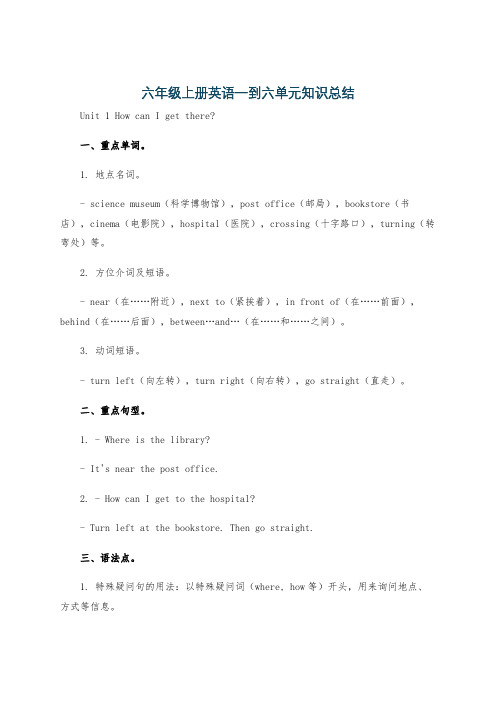
六年级上册英语一到六单元知识总结Unit 1 How can I get there?一、重点单词。
1. 地点名词。
- science museum(科学博物馆),post office(邮局),bookstore(书店),cinema(电影院),hospital(医院),crossing(十字路口),turning(转弯处)等。
2. 方位介词及短语。
- near(在……附近),next to(紧挨着),in front of(在……前面),behind(在……后面),between…and…(在……和……之间)。
3. 动词短语。
- turn left(向左转),turn right(向右转),go straight(直走)。
二、重点句型。
1. - Where is the library?- It's near the post office.2. - How can I get to the hospital?- Turn left at the bookstore. Then go straight.三、语法点。
1. 特殊疑问句的用法:以特殊疑问词(where, how等)开头,用来询问地点、方式等信息。
2. 一般现在时在问路指路中的运用。
Unit 2 Ways to go to school.一、重点单词。
1. 交通工具名词。
- by bike(骑自行车),by bus(乘公共汽车),by train(乘火车),by plane(乘飞机),on foot(步行),ship(轮船),subway(地铁)等。
2. 形容词。
- slow(慢的),fast(快的)。
3. 其他。
- traffic(交通),traffic lights(交通灯),stop(停),wait(等)。
二、重点句型。
1. - How do you come to school?- Usually, I come on foot.2. - How can I get to the Fuxing Hospital?- Take the No. 57 bus over there.三、语法点。
2017最新广州版英语六年级上册知识点汇总

2017最新广州版英语六年级上册知识点汇总知识点概要:Module 1 Country lifeUnit 1 What are those farmers doing?Unit 2 A country life is a healthy lifeModule 2 City lifeUnit 3 Where are you from?Unit 4 I like the city very muchModule 3 HealthUnit 5 What’s the matter with you?Unit 6 The secret to good healthModule 4 Past experiencesUnit 7 What did you do yesterday?Unit 8 A trip to Hong KongModule 5 ChangesUnit 9 Was I a good girl back then?Unit 10 Then and nowModule 6 FestivalUnit 11 I like the Spring Festival bestUnit 12 Christmas以下为详细内容▼Module 1 Country lifeUnit 1 What are those farmers doing?一、词组feed the chickens and ducks feed the pigs feed the horse grow flowers and vegetables plant trees cut grassany other on the farm a few…二、句型:1.What are those farmers doing?They’re cutting grass to feed the animals.2.What do you grow on your farm?3.We have a few goats and pigs.4.There are fruit trees in this field.5.There is a cow on the farm.三、重点精析:1. any other + 名词单数,指一堆当中的的某一个any other + 名词复数,指一堆当中的一些如:Tom runs faster than any other student in his class.汤姆比他班上的任何人都跑得快。
广州版小学英语 六年级上册 U11 I like the Spring Festival best
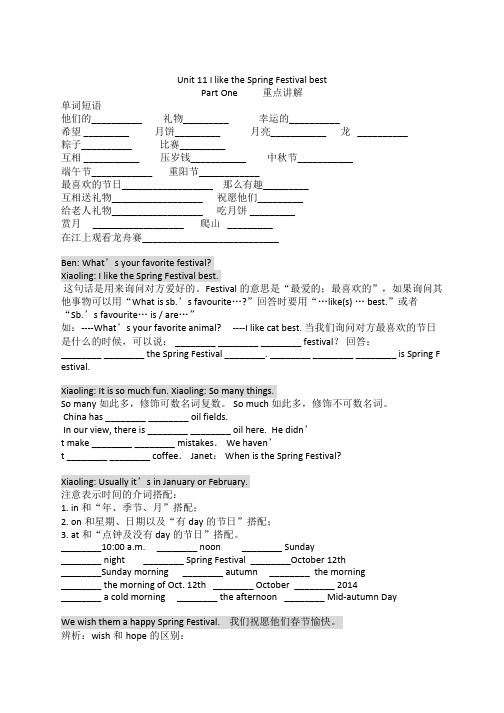
Unit 11 I like the Spring Festival bestPartOne 重点讲解单词短语他们的__________ 礼物_________ 幸运的__________希望 _________ 月饼_________ 月亮___________ 龙 __________ 粽子__________ 比赛_________互相 ___________ 压岁钱___________ 中秋节___________端午节____________ 重阳节____________最喜欢的节日__________________ 那么有趣_________互相送礼物__________________ 祝愿他们_________给老人礼物__________________ 吃月饼 _________赏月 __________________ 爬山 _________在江上观看龙舟赛___________________________Ben: What’s your favorite festival?Xiaoling: I like the Spring Festival best.这句话是用来询问对方爱好的。
Festival的意思是“最爱的;最喜欢的”,如果询问其他事物可以用“What is sb.’s favourite…?”回答时要用“…like(s) … best.”或者“Sb.’s favourite… is / are…”如:----What’s your favorite animal? ----I like cat best. 当我们询问对方最喜欢的节日是什么的时候,可以说: ________ ________ ________ festival?回答:________ ________ the Spring Festival ________. ________ ________ ________ is Spring F estival.Xiaoling: It is so much fun. Xiaoling: So many things.So many如此多,修饰可数名词复数。
- 1、下载文档前请自行甄别文档内容的完整性,平台不提供额外的编辑、内容补充、找答案等附加服务。
- 2、"仅部分预览"的文档,不可在线预览部分如存在完整性等问题,可反馈申请退款(可完整预览的文档不适用该条件!)。
- 3、如文档侵犯您的权益,请联系客服反馈,我们会尽快为您处理(人工客服工作时间:9:00-18:30)。
★bored
厌烦的
★go away
走开
★go boating
去划船
★go swimming
去游泳
★later
以后
★match
比赛
★poor
可怜的
★won't=will not
将不
circus
马戏团
二、短语
1.
buyhamburgersfor lunch
为午餐买汉堡
2.
come to a party
意大利
Italian
意大利的
national
国家的;民族的
national flag
国旗
New York
纽约
Ottawa
渥太华
Paris
巴黎
Rome
罗马
Sydney
悉尼
Tokyo
东京
WashingtonD.C.
华盛顿特区
Wellington
惠灵顿
二、短语
1.
Chinese national flag= national flag ofChina
中国国旗
2.
look at…
看……
3.
the biggest city
最大的城市
4.
the capital city
首都
5.
the capitalcityofChina
中国首都城市
6.
thethree flags
这三面国旗
8.
the national flag ofFrance= theFrancenational flag
不是
message
电话,打电话
take a message
传递消息
telephone
忙的
二、短语
1.
at home
在家
2.
at lunch time
午餐时间
3.
at school
在学校
4.
beafraidof
害怕……
5.
be free
有空
6.
call sb.
给……打电话
7.
come back
回来
8.
invite
邀请
picnic
野餐
二、短语
1.
all the people in my class
我班上所有的人
2.
bring a friend
带个朋友来
3.
bring some food
带些食物来
4.
have a party
开聚会
5.
have a picnic outside
在户外野餐
6.
help sb.dosth.
先问问你的父母
2.
athalf past eight= at eight thirty
在八点半
3.
come tomyhouse
到我家
4.
go fishing
去钓鱼
5.
go swimming = go to swim
去游泳
6.
goto the cinema
去电影院
7.
had better do sth.
我们一起去看电影狮子王,好吗?
Sorry, I’m busy now.Maybe later.
抱歉,我正忙呢。迟些时候吧。
OK./ All right. / Sure.
可以。/好吧。/当然。
2.
Would you like to come to my party?
你能来我的聚会吗?
Yes, I’d love to.
非常感谢
14.
totell you the truth
告诉你真相
15.
watch the football game on TV
在电视上看足球赛
六、句型
1.
Would you like to go with us?
你愿意和我们一起去吗?
Yes,I'd love to, thanks a lot.
非常愿意,谢谢。
最好做某事
8.
Let me see.
让我看看。
9.
like doing sth.
喜欢做某事
10.
on Thursday morning
在星期四早上
11.
play table tennis
打乒乓球
12.
see a film
看电影
13.
thanks a lot = thank you very much
dimsum
点心
pearl
珍珠
thePearl River
珠江
temple
庙
theSixBanyanTemple
六榕寺
yummy
味道好的;好吃的
二、短语
1.
all of us
我们大家
2.
buy new clothes
买新衣服
3.
climbtheBaiyun Hill
爬白云山
4.
do some reading
澳大利亚的首都是什么?
The capital ofAustraliaisCanberra.
澳大利亚的首都是堪培拉。
Canberra.
堪培拉。
Unit 5Where Would They Like to Go OnHoliday?
一、单词
★just
仅仅;恰好
★maybe
可能
★mountain
山;山脉
★noisy
要我带些食物来吗?
No, it's OK.
不用了。
Sure./ All right.
行。/可以。
4.
What time is the party?
聚会什么时候开始?
It starts at one o'clock.
1点钟开始。
At one o’clock.
在1点钟。
At 1:00.
在1点。
Module 4On the Telephone
12.
go to the circus
去看马戏
13.
look happy
看起来高兴
14.
maybe later
迟些时候
15.
playcomputergames
打电子游戏
16.
play football
踢足球
17.
seeafilm
看电影
18.
watchTV
看电视
三、句型
1.
Shall we go to see the film The Lion King?
吵闹的
★quiet
安静的
★the Great Wall
长城
Berlin
柏林
crowded
拥挤的
Moscow
莫斯科
million
百万
population
人口
Russia
俄罗斯
二、短语
1.
a good idea
一个好主意
2.
anidea
一个主意
3.
a good place to visit
一个游览的好地方
来聚会
3.
come to tea
来喝茶
4.
do nothing
无所事事
5.
getwet
淋湿了
6.
go boating
去划船
7.
go for a walk
散步
8.
goshopping
去购物
9.
go sightseeing
去观光
10.
go swimming
去游泳
11.
go to thecinema
去看电影
读书
5.
eatdimsumatGuangdongrestaurant
在广东酒家吃点心
6.
good idea
好主意
7.
go on the Pearl River Cruise
游珠江
8.
go shopping inXiajiu Road
在下九路购物
9.
GuangzhouArt Museum
广州艺术博物馆
Module 1Plans
Unit 1What Are We Going to Do for OurHoliday?
一、单词
★a lot of
许多......
★lot
许多
★clothes
衣服
★have fun
玩得开心
★have been to
到过
★instead
代替
★plan
计划
cruise
漫游;游弋
我想去罗马。
3.
Why don't we go back toBeijing?
我们为什么不回北京呢?
That's a good idea!
那是个好主意。
Module3An Invitation
Unit7Ben Wants to Play Football
一、单词
★away
离开
★come to tea
leavea message
留言
9.
on the phone
通话中
10.
phone sb.
给……打电话
11.
上网
19.
